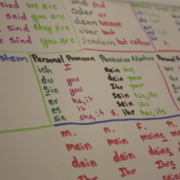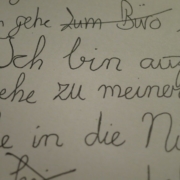10 German words that every language should have
They say that the language of a nations reflects its culture and mentality, even more so if there are words that can’t be directly translated in other languages.
These are precisely the most interesting words to study or observe with attention because they allow us to really grasp a different culture and norms. So here are 10 beautiful and intricate German words to learn:
#10 SCHILDERWALD
A forest of road signs. So many road signs that you’ll get confused by all the directions indicated and get lost.
#9 KOPFKINO
To have a mental movie going on. Well, to whom did it never happen? Imagining in our head the best and worst scenarios we would say.
#8 LUFTSCHLOSS
In English we would say “to build castles in the air”. Something desired, but far away from reality: a project or idea that can be hardly achievable.
#7 SCHNAPSIDEE
That crazy idea that you will get in a moment of absolute euphoria, at times caused by an excessive consumption of alcohol. Genius ideas that might reveal to be a total disaster or an acclaimed success.
#6 AHNUNGSLOSIGKEIT
The lack of knowledge, opinions, awareness. According to the context it might indicate being naive, ignorant or ingenuity.
#5 FINGERSPITZENGEFUEHL
An immediate awareness and empathy with our surroundings, that allows us to respond promptly and diplomatically.
#4 STREBEN
The origin of the term resides in the German romantic period, when this word indicated the detachment from everyday life to reach that intangible level of perfection. Today the term indicates the effort and determination required to fullfill one’s ambitions.
#3 GEBORGENHEIT
Most of the dictionaries translate this term simply as “certainty”. In reality there are many more nuances that go over and across the meaning of this word: an incredible combination of certainty, protection and intimacy derived from relations with others, in particular your family.
#2 VERSCHLIMMBESSERN
Making a situation worst in the attempt of making it better. Like trying to fix that bad haircut at home on your own..
#1 WANDERLUST
The desire to leave. That uncontrollable itch that makes you want to travel and explore the world, see new places and make new experiences.
————
Are you getting intrigued by the German language or wish to refine your vocabulary? Then take a look at the German courses that Berlino Schule organizes!






















